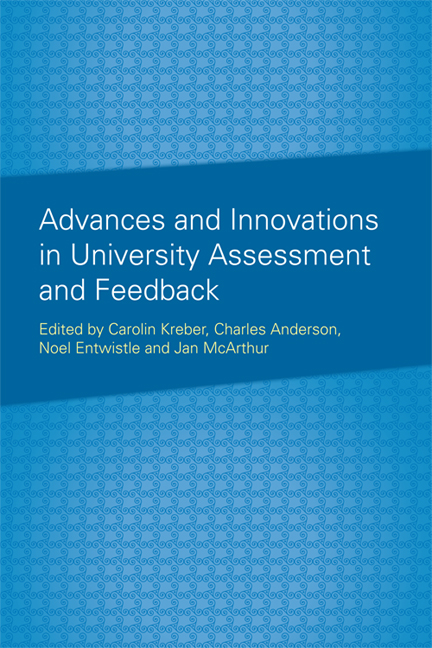Book contents
- Frontmatter
- Contents
- List of Tables and Figures
- Acknowledgements
- Foreword
- Introduction
- Part A Changing Perspectives on the Nature and Purposes of Assessment
- Part B Students' Perceptions of Assessment and Feedback
- 4 Perceptions of Assessment and their Influences on Learning
- 5 Students' and Teachers' Perceptions of Fairness in Assessment
- 6 Perceptions of Assessment Standards and Student Learning
- Part C Reconceptualising Important Facets of Assessment
- Part D Innovations in Assessment Practices
- Notes on the Contributors
- Index
5 - Students' and Teachers' Perceptions of Fairness in Assessment
from Part B - Students' Perceptions of Assessment and Feedback
Published online by Cambridge University Press: 05 August 2016
- Frontmatter
- Contents
- List of Tables and Figures
- Acknowledgements
- Foreword
- Introduction
- Part A Changing Perspectives on the Nature and Purposes of Assessment
- Part B Students' Perceptions of Assessment and Feedback
- 4 Perceptions of Assessment and their Influences on Learning
- 5 Students' and Teachers' Perceptions of Fairness in Assessment
- 6 Perceptions of Assessment Standards and Student Learning
- Part C Reconceptualising Important Facets of Assessment
- Part D Innovations in Assessment Practices
- Notes on the Contributors
- Index
Summary
Introduction
Earlier chapters in this book have already made clear the significant role that assessment plays in the learning process, established that students are sensitive about what will be assessed and elucidated how assessment is undertaken. Indeed, assessment significantly influences students' ways of studying by forming a ‘hidden curriculum’ (Brown, Bull, and Pendlebury 1997; Struyven, Dochy, and Janssens 2005; Hodgson and Pang 2012), which guides the direction and extent of their efforts. Morover, grades have a profound impact on students' sense of their own abilities and achievements (Sadler 2009).
However, there is evidence that teachers do not necessarily have the competencies necessary to assess in a valid and reliable manner (Prosser and Trigwell 1999; Parpala and Lindblom-Ylänne 2007; Postareff et al. 2012). Students may thus obtain good grades in exams, without ever reaching a firm understanding of the course's fundamental ideas (Ramsden 2003; Segers, Dochy, and Cascallar 2003; Struyven, Dochy, and Janssens 2005). Fleming (1999) has noted that, even though grades play such a major role in students' lives and are widely used as indicators of the quality of higher education, their role as objective indicators of learning outcomes is rarely questioned (see, also, Knight 2002).
Recently, an extensive set of projects have been carried out at the Centre for Research and Development of Higher Education at the University of Helsinki that have been designed to explore a variety of issues related to the experiences of students and intended to help university teachers provide a more supportive learning environment for their students. In this chapter, we are looking specifically at students' and teachers' experiences of the fairness of assessment. We are also exploring issues related to course grades, which are often used as objective indicators of the quality of learning, to see whether these grades sufficiently mirror students' actual learning achievements. The idea of ‘fairness’ is important, because this term is often utilised when students express their feelings about assessment (Sambell, McDowell, and Brown 1997). From a research perspective, the issue of ‘fairness’ raises questions about the reliability and validity of the methods used to measure levels of attainment in higher education, and these links form the major focus of our current study.
- Type
- Chapter
- Information
- Publisher: Edinburgh University PressPrint publication year: 2014



